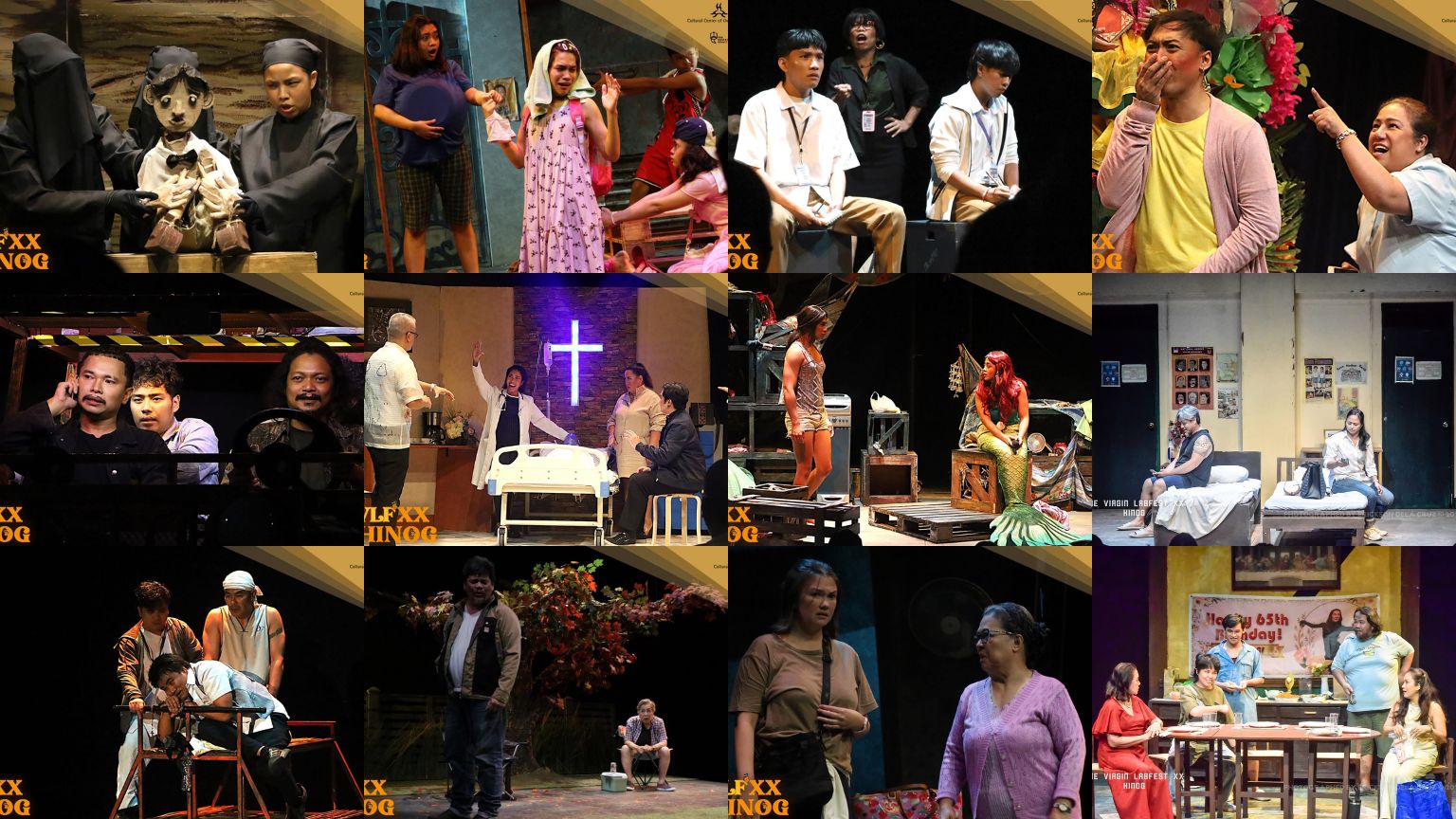
REVIEW: 12 Virgin Labfest XX “Hinog” Plays
The country’s longest-running one-act festival is celebrating its 20th year with a seriously strong line-up.
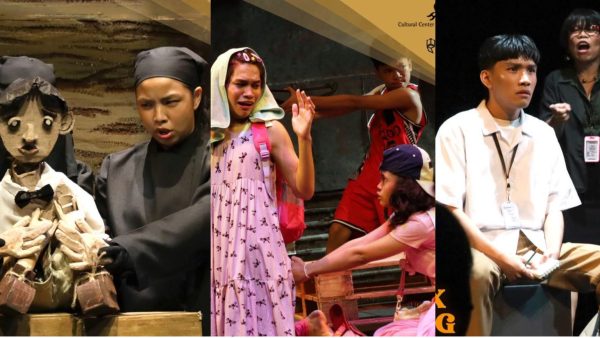
SET A; Photos from the Cultural Center of the Philippines Facebook Page
“Ang Bata kag Ang Ilaga”
(written by Lian Carlo Suelan; directed by Siglo)
A young orphan confronts a quiet moral dilemma in Ang Bata kag Ang Ilaga, where a baby rat becomes a fable to the protagonist’s own longing for care and belonging. While thematically rich in intent—questioning selective empathy and childhood emotional imprinting—the execution doesn’t quite land. The decision to portray Isaac as a puppet is visually curious but ultimately alienating, never fully justifying itself narratively or emotionally. Heavy use of untranslated Hiligaynon adds another layer of distance, making the story feel opaque rather than immersive. Despite its sincere ambition, the piece struggles to find clarity and impact in both writing and staging.
“Takbo, Batang Tondo”
(written by Yoj; directed by Chic San Agustin-De Guzman)
Takbo, Batang Tondo presents a gritty slice of larong kalye, as four kids act out a chaotic game of bahay-bahayan under the scorching Tondo sun. There’s conflict, roleplay, and a missing toy that spirals into a mock-police interrogation—but the stakes never fully land. The premise hints at layered commentary on childhood and power, but ultimately plays out like a dramatized recess spat. Though energetically performed by a teenage cast, the tone stays flat, and the characters’ ages—and urgency—are hard to pin down. Less profound than it wants to be, the piece feels more like watching kids argue in the street than uncovering any real emotional terrain.
“Polar Coordinates”
(written by Ade Valenzona; directed by Paolo O’Hara)
While Polar Coordinates draws from familiar tropes—fractured families, coming-of-age confusion, and the chaos of high school math—it does so with refreshing authenticity and a distinct sense of purpose. Ade Valenzona’s script cleverly entwines emotional disorientation with mathematical metaphor, as Igo’s struggle with polar coordinates mirrors his struggle to locate himself amid academic pressure and personal upheaval. A traumatic discovery about his authoritarian father—whose own internalized homophobia casts a long shadow—intersects with Igo’s own budding queerness, creating a layered portrait of silence, shame, and self-recognition. Paolo O’Hara’s direction is deliberate and resonant, with Justin Santiago’s projection design excelling: Jerome Aytona’s clean, clinical set and Allie Eguia’s sharp costuming visualize the emotional rigidity of Igo’s world. Strong performances across the board elevate this moving, cerebral one-act that asks not just where we are—but how we begin to chart where we’re going.
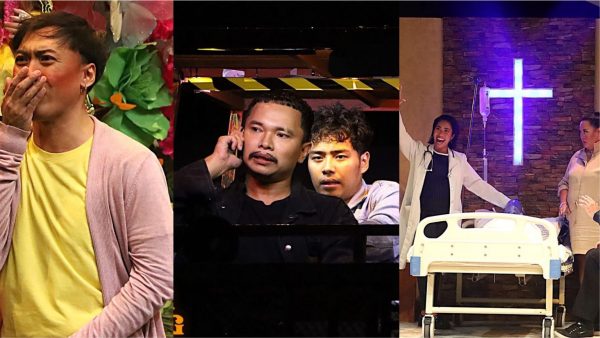
SET B; Photos from the Cultural Center of the Philippines Facebook Page
“Minating Ni Mariah ang Manto ng Mommy ni Mama Mary”
(written by Eljay Castro Deldoc; directed by Dexter M. Santos)
A riotous romp through the ornate world of pagsasanto, this one-act is a comedy of faith, scandal, and self-styled redemption. Lian Silverio is in top form as the flamboyant Mariah, mining every beat of the character’s camp and conviction. Mosang plays a deliciously devout foil, while Esteban Mara’s character adds cheeky tension—especially once George De Jesus III’s priest enters the mix. The humor lands consistently, with the play offering a lively and barbed look at devotion, class, and the many masks worn in the name of salvation.
“Unang Araw”
(written by Ivan Gentolizo; directed by Cholo Ledesma)
A tight, politically charged thriller, Unang Araw throws us into the fraying psyche of four hired guns on a deadly mission in the name of loyalty, power, and legacy. Ivan Gentolizo’s script sharply interrogates how the machinery of Duterte’s drug war, even before his presidency, demanded not just obedience but the full surrender of one’s humanity. Cholo Ledesma directs with unflinching clarity, embracing the blood, violence, and raw urgency when the story calls for it. The energy is relentless, with a fantastic ensemble (Aldo Vencilao, Earvin Estioco, DMs Boongaling, and Ybes Bagadiong) delivering performances that are frantic, desperate, and at times exhilarated. Io Balanon’s skeletal jeep set, made of exposed wire, is a striking visual anchor. It frames the space and action effectively, letting us peer into every corner of this charged, claustrophobic journey. A potent reminder that the real horror lies not in monsters but in the systems that shape and unleash them.
“Presidential Suite # 2”
(written by Siege Malvar; directed by Johnnie Moran)
A scathing, intelligent dissection of political dynasties, Presidential Suite #2 drops us into the post-heart-attack recovery of Senator Zaragoza, whose legacy bill and alleged money laundering set the stage for her children’s quiet power grab. Siege Malvar’s script captures how ambition seeps into family dynamics, portraying love, duty, and betrayal with chilling precision. The calculated jockeying for succession feels disturbingly familiar, with filial affection weaponized for political gain. While Johnnie Moran’s direction leans into the comedic absurdity of it all, the core message remains sharp. Behind every charming political family is a ruthless survival strategy. A darkly entertaining one-act that doesn’t just expose political rot; it makes it personal.
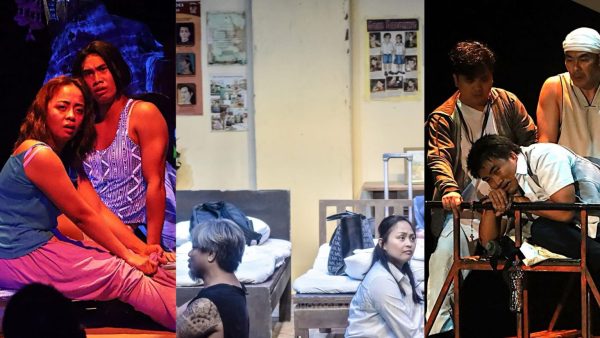
SET C; Photos from the Cultural Center of the Philippines Facebook Page; Middle photo by Erickson Dela Cruz
“Mga Magindara Sa Siyudad”
(written by Chris Joseph Junio; directed by Riki Benedicto)
Set on a makeshift plywood stage within the world of a crumbling perya, Mga Magindara sa Siyudad follows Maureen and Maylene, aging “sirena” performers clinging to their nightly song-and-dance routine as audiences dwindle and relevance fades. The premise holds promise: a meditation on labor, exploitation, and the seductive trap of hope, but the script leans heavily on repetition and familiar beats, making the piece feel longer than it is. Raf Pineda and Donna Cariaga deliver performances that are passable but lack the lived-in grit or vulnerability the roles demand. Director Riki Benedicto’s vision never quite pierces through the play’s static rhythm. The show floats in place, invoking hardship without making us feel its weight.
“The Late Mister Real”
(written by Rolin Migyuel Obina; directed by Maynard Manansala)
Set during the isolating height of the pandemic, The Late Mister Real finds long-separated couple Boyet and Raquel forced into neighboring isolation rooms where they are close enough to talk but far enough to never fully connect. Roi Calilong and She Maala anchor the one-act with textured, lived-in performances: Calilong as the embittered ex-husband who masks regret with misplaced humor and defensive pride, and Maala as the pragmatic, upwardly mobile woman whose clarity about the past is matched only by her resolve for the future. Obina’s writing is serviceable, though often saved by the emotional specificity of its actors. The title’s clever wordplay (“late” as in former, then literal) finds chilling resonance in a final turn that sees Boyet morph from joke to ghost. Yet some staging choices (a rope, suddenly?) strain plausibility and momentarily jar the emotional rhythm.
“Ang Problema sa Trolley”
(written by Imuthis; directed by Adrienne Vergara)
Tautly staged atop an actual railway track thanks to Wika Nadera’s ingenious set and Dee Tanteco’s quiet moonlit video design, Ang Problema sa Trolley attempts to literalize the trolley dilemma, sending three strangers across a Pandacan bridge where a philosophical standoff awaits. The narrative swings for heavy moral questions, particularly around justice, retribution, and what society truly owes its victims. While the central “twist”—a mall consignor’s abrupt confession of an unforgivable crime—feels more functional than earned, the play’s commitment to the gray areas of accountability resonates. Mario Magallona lends gravitas as the gruff trolley driver, while James Lanante brings a gentle but conflicted presence as the nursing student caught in the ethical crossfire.
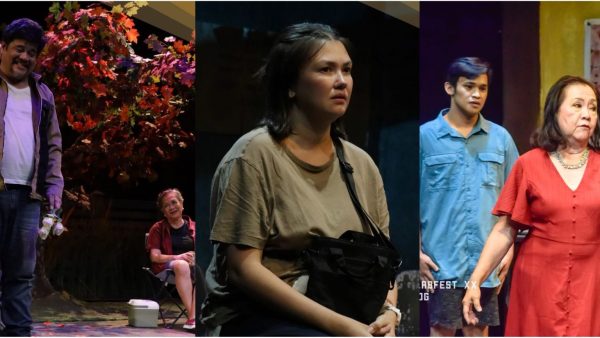
SET D; Photos from the Cultural Center of the Philippines Facebook Page; Rightmost photo by Erickson Dela Cruz
“Anniversary”
(written by Nelsito Gomez; directed by Sarah Facuri)
In Anniversary, Nelsito Gomez thoughtfully examines grief through an unlikely cemetery conversation between Rob (Jamie Wilson), a widower contemplating suicide, and May (Bibeth Orteza), a blunt, elderly queer woman whose deadpan and occasionally crass humor keeps sentimentality at bay. The dialogue is sharp and director Sarah Facuri complements the quiet mood through minimalist staging, enhanced notably by a striking tree with orange leaves at centerstage. Wilson and Orteza share a genuine chemistry, allowing humor and heartache to coexist naturally. The result is a gently poignant encounter about the uncomfortable yet healing intimacy between strangers.
“Don’t Meow for Me, Catriona”
(written by Ryan Machado; directed by Toni Go-Yadao)
Set in a hauntingly realistic Cubao bus terminal during the pandemic, Ryan Machado’s Don’t Meow for Me, Catriona confronts the quiet ache of caretaking and the emotional toll of familial duty. Anchored by nuanced performances from Peewee O’Hara and a disarmingly natural Angelica Panganiban (in a confident stage debut), the play explores a daughter’s desperate desire for selfhood after years of self-sacrifice. But while the emotions simmer compellingly, the script doesn’t quite bring its characters to a full boil—making the daughter’s brutal confession of feeling “free” when she briefly thought her mother had died, and the mother’s sudden disappearance into the night, feel under-earned. The production’s hyperrealism also invites real-world questions—surely someone still has to find the mother? There’s something poignant here, but it doesn’t fully crystallize.
“Mommy G”
(written by Jobert Grey Landeza; directed by Lhorvie Nuevo-Tadioan)
Mommy G unfolds as a riotously drawn family dramedy where laughs land easily, but the discomfort lingers just beneath. On her 65th birthday, Gina (played with quiet conviction by Sherry Lara) drops a bombshell that unsettles her Manila-based children: she’s in love with a much younger man (Gelo Molina). What follows is a tense, often funny dinner table reckoning, with each child projecting their own biases and insecurities. Sheenly Gener is a standout as Sofie, the eldest daughter whose hysteria masks deeper contradictions including her own age-gap relationship. The play doesn’t press too hard on its social questions, but it does make space for them: about judgment, agency, and who gets to decide what’s acceptable. It leaves you not with neat answers, but with just enough unease to keep the conversation going after the lights come up.
Tickets: Php 800 – 1000
Show Dates: June 11 – 29, 2025
Venue: CCP Black Box, Malate, Pasay City
Running Time: approx 3 hrs (w/ 15-min intermission after every act)
Company: Cultural Center of the Philippines, Tanghalang Pilipino, The Writer’s Bloc


Comments